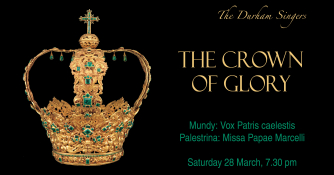Details
St Cuthbert's Chapel
College Road
Ushaw College
Durham
County Durham
DH7 9RH
England
Programme
Robert Parsons – Ave Maria
Francisco Guerrero – Ave virgo sanctissima
William Mundy – Vox Patris Caelestis
Giovanni Pierluigi da Palestrina – Missa Papae Marcelli
Performers
Julian Wright – Conductor
Durham Singers
Programme Note
Two jewels in the crown of Renaissance polyphony, written at almost the same time, but worlds apart in style. William Mundy’s Vox Patris Caelestis, possibly written in honour of Mary Tudor, is a complex and lavish setting of a text inspired by the Song of Songs. Long interweaving melodic lines caress the most sensuous words and Mundy uses the full expressive pallette of the choir, creating striking effects from different combinations of parts, sometimes just two or three, and sometimes six or seven.
Such gloriously complex music alarmed the reforming Council of Trent, who were so concerned that the text was unintelligible that they threatened to ban polyphony altogether. In writing his Missa Papae Marcelli, Palestrina rose magnificently to this challenge, proving that it was possible to write polyphony with crystal clear text. The Missa Papae Marcelli is one of Palestrina’s best loved pieces, full of gorgeous tunes and graceful interplay between the voices. Pope Marcellus himself only reigned for three weeks, but his name shines on in Palestrina’s luminous music, which was frequently sung at Papal coronations.
Our musical snapshot of mid-sixteenth century Catholic Europe is introduced with contrasting motets to the Virgin Mary by Robert Parsons from England and Francisco Guerrero from Spain.

 Your events at Classical Events
Your events at Classical Events

